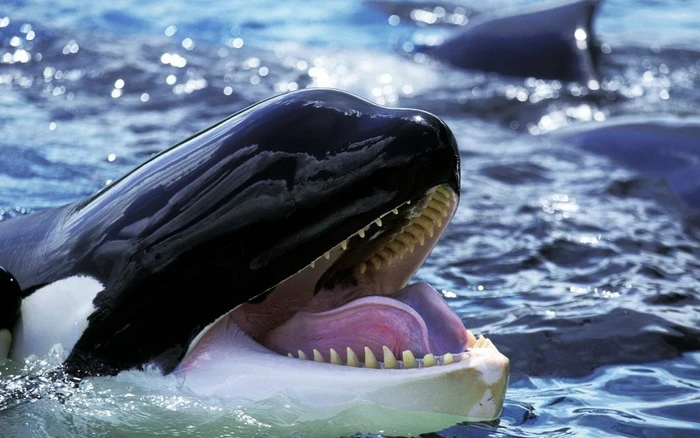This captive orca named Wikie is truly extraordinary: she is the first orca documented to “speak” a language she had never used before. Specifically, Wikie can say “hello” and “bye bye” in human language.
Oh, and one crucial detail: we can absolutely call this species of killer whales (which are friendly to humans) the “pandas of the ocean” due to their striking black-and-white bodies.
An international research team recently published a scientific report highlighting the remarkable speaking abilities of Wikie, an orca living at Marineland Aquarium in Antibes, France.

Orcas are highly intelligent marine mammals. Their name, “killer whale,” is no joke—they are apex predators. They are skilled at toying with prey, seizing opportunities, employing specific hunting techniques for different species, and are incredibly efficient hunters. Historical records even show orcas hunting alongside humans.
Their intelligence makes orcas ideal candidates for training, though many oppose this practice due to their highly social nature. Orcas live in tight-knit family pods, so capturing them and placing them in large aquariums with unfamiliar companions is, to some, rather cruel.
Within their pods, orcas use distinct vocalizations—a unique language that scientists can distinguish with the naked ear. A groundbreaking 2014 study revealed that orcas can learn new languages, even from entirely different species.
The star of this research is Wikie, who has demonstrated the ability to mimic her trainer’s commands. Wikie learned to blow raspberries (like children do), imitate the creak of a door, say “hello” and “bye bye,” and repeat numbers.
This marks the first time an orca has been recorded mimicking human-taught sounds. Previously, only three other animals achieved this: a seal in 1985 (a landmark study), an elephant in 2012 (which mimicked Korean by placing its trunk in its mouth, as seen in a video), and a beluga whale in 2012 (documented in a research paper). Last year, a beluga was recorded “speaking” in “dolphin language.”
Wikie’s study was conducted quickly and wasn’t particularly in-depth. Using both direct interaction and audio recordings, Wikie could replicate words, phrases, and sounds after about 10 attempts. While her sounds aren’t perfectly clear, listeners can still discern what she’s trying to say.
However, it’s important to clarify that there’s no evidence Wikie understands the meaning of what she’s saying. Still, this study provides further proof that marine mammals can adapt their vocalizations to new environments. It also supports the hypothesis that orcas use sounds to learn about social dynamics.
“The research results show that orcas have evolved the ability to control sound production with impressive sound quality,” the researchers concluded in their report.
For those curious about the relationship between humans and orcas, it’s worth noting that no wild orca attacks on humans have resulted in fatalities. In one case, an orca attempted to tip an ice floe carrying a photographer and a team of sled dogs, likely triggered by the dogs’ barking. In another, a boy was nudged by an orca while splashing in an area with seals, possibly mistaken for prey.
In contrast, since the 1970s, there have been nearly 12 incidents of captive orcas attacking humans, some resulting in fatalities.